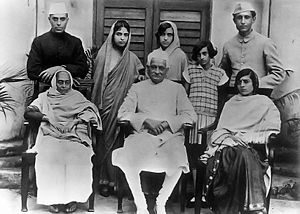
Varun Gandh’s candidacy and his alleged hate speech are all over the news right now, and who can really blame the media? Nehru’s great-grandson running under the flag of the BJP and spewing anti-Muslim filth in his campaign speeches? It’s better than last year’s scoop that Barack Obama and Dick Cheney are distant cousins. Varun and his mother, having turned (or been pushed) away from the family’s Congress dynasty, slowly entered the fold of the BJP (Maneka did not formally join the party until 2004). Varun is contesting the Pilibhit seat in Uttar Pradesh this election and running an increasingly sectarian campaign, hoping to play on anti-minority sentiments and fear of Pakistani/Muslim aggression. With this move, he has staked out a place at the bleeding radical edge of accepted Hindutva politics and, as a looming figure in his party, pulled the rest of the BJP back to a militant position it has backed away from in the last few years.
Varun is an interesting avatar for militant Hinduism, and not only because of his storied lineage. Before his political debute, Mail Today reports, he was known as a quiet scholar and poet among friends. A graduate of the prestigious LSE and SOAS, he published a book of poetry in 2000 with the curious title, “The Otherness of Self.” In one composition titled “Prince of Wounds,” he makes the prophetic declaration:
I confess
I am a little in love with my sin
As I stray
I am told
Don’t think but look
The walk must show the way
So there’s no accountability
A stranger is just a victim you haven’t met.
With this soul-searching screed in mind, I wonder if Varun’s recent nasty streak might have less to do with cutting off the “otherness of self” and more to so with saavy opportunism (as does much political chauvinism). The sin that he loves is not the exotic (and easy to hate) sin of bigotry and rabid communalism, but instead the more familiar sin of calculated, yet dangerous, political manipulation in the quest for power. In this light, Varun is not so much the family pariah as legitimate heir to the throne. It just goes to show, you can wrap a Gandhi in saffron, but he’s still a Gandhi.
Full article from Mail Today at http://www.intoday.in/index.php?option=com_content&task=view&issueid=&id=25059§ionid=5&secid=27&Itemid=1

